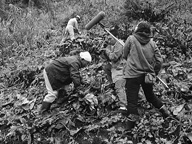| Yunnan Visual Forum in Yamagata |
|---|
|
Part 1 Part 2 |
Yunnan Visual Forum in Yamagata
Indigo dyeing, utagaki dancing, evergreen forests and terraced rice fields. The customs and scenery of the ethnic minorities of Yunnan Province in China inspire a kind of nostalgia in the hearts of the Japanese. For this reason, Japan’s mass media often refers to the area as the “landscape of ancient Japan.” This program, however, does not aim to immerse itself in such nostalgia.
In order to introduce two ethnographic documentaries I made with my students at the Tohoku Culture Research Center, I participated in the Yunnan Multi Culture Visual Festival held in Kunming City in March, 2003. There, the sight of young minority artists battling to protect their traditional culture by taking up cameras and documenting their own lives captured my attention. They are no longer just subjects for foreign media and researchers. To them, visual media is an important means with which to transmit their traditional culture to the next generation, as well as a new form of self-expression for minorities.
The Tohoku Culture Research Center at the Tohoku University of Art and Design and the Yamagata International Documentary Film Festival collaborated to hold this program of events, to which we welcome three visual artists from Yunnan. Nine films will be shown in total—images of ethnic minorities from the pre-Cultural Revolution era, current endeavors to visually document and preserve traditional culture, and works by rising filmmakers who have adopted contemporary trends. These screenings are likely to bring up a number of issues, such as the long history of exploring images of Yunnan and future possibilities for visual anthropology. These issues are certain to be vital clues for those of us here in Tohoku as we continue to capture images of the people and culture of our own region.
—Muguruma Yumi
Associate Professor, Tohoku University of Art and Design
 About the Tohoku Culture Research Center
About the Tohoku Culture Research Center
The Tohoku Culture Research Center at the Tohoku University of Art and Design is an institution established with the goal of uncovering the buried memories of Tohoku and developing its local heritage. Its mission also extends to casting light on the diverse cultures of the Tohoku region, the Japanese Archipelago and East Asia. Research results are announced through journals such as Tohokugaku and Kikan Tohokugaku as well as through the East Asian cultural performances held on the floating Noh stage on campus. Together with students, the Center also endeavors to create visual records of the traditional culture of Tohoku and Yamagata Prefecture, including such practices as field burning, shinaori weaving, and crafts made from the matatabi vine. |
A Visual Festival from South of the Clouds
The origins of celluloid visual documents in Yunnan go back to the late Qing Dynasty. However, it was between 1950 and 1970 that documentary film production truly began, when ethnographers teamed up with filmmakers to produce the twenty-one films of The Chinese Historical Ethnographic Film Series—a priceless record of China during that period, and more specifically, of the societies of Yunnan’s sixteen ethnic minorities.
The 1980’s saw the emergence of documentaries that brought the individual into the foreground and paid more attention to culture. Then in the 1990’s, a graduate program in Visual Anthropology was established. Gradually, these developments combined with the efforts of NGOs engaged in community development and the arts contributed to establishing a cultural scene that would give birth to a new film festival.
In March 2003, the Yunnan Provincial Museum collaborated with several universities in Kunming to host the first Yunnan Multi Culture Visual Festival, or YUNFEST. In March 2005, the Yunnan Academy of Social Sciences, the BAMA Mountain Culture Research Institute and the Yunnan Provincial Library, with the help of several universities and the Yamagata International Documentary Film Festival, organized the second YUNFEST, staging over eighty events and showcasing six Japanese documentary classics.
One of the highlights of the last YUNFEST was the Participatory Visual Education section. It brought NGO workers and grassroots community groups together on the same platform, providing the public with an opportunity to hear the ‘voices’ emanating from the communities.
—Guo Jing
Professor and Director, BAMA Mountain Culture Research Institute,
Yunnan Academy of Social Sciences; Director, Yunnan Multi Culture Visual Festival
